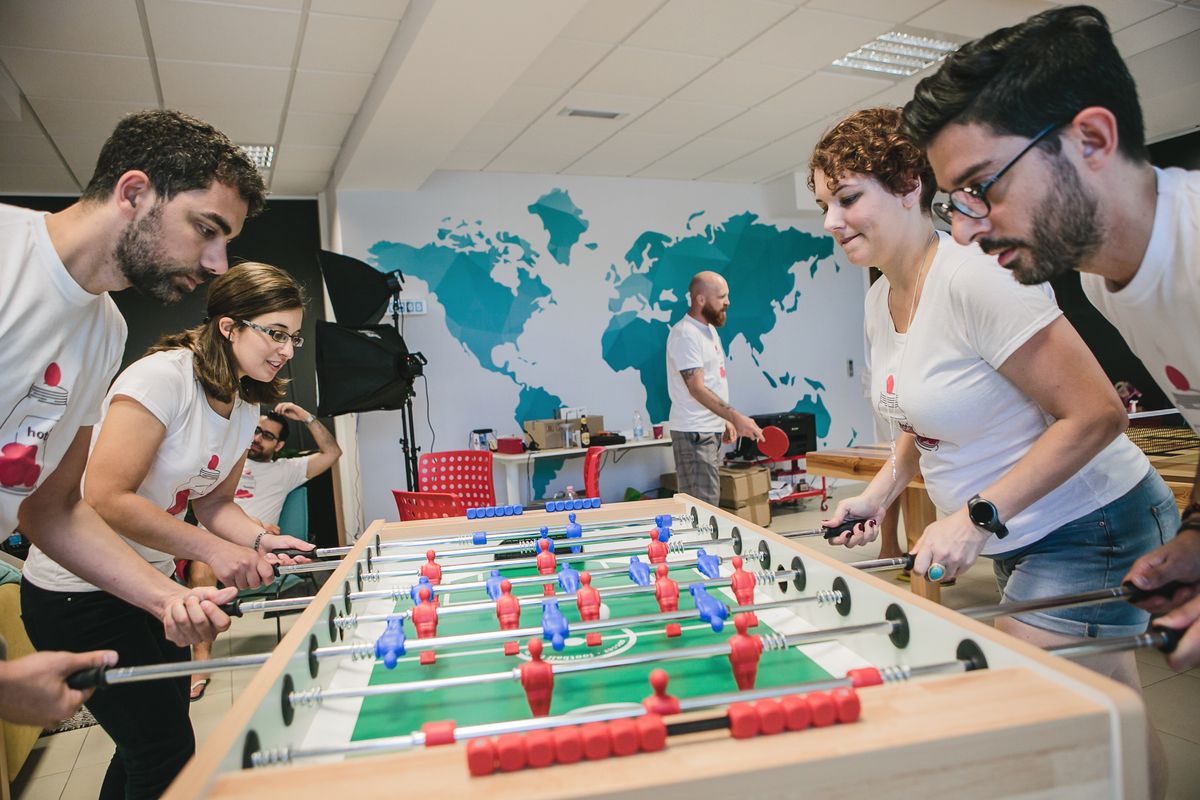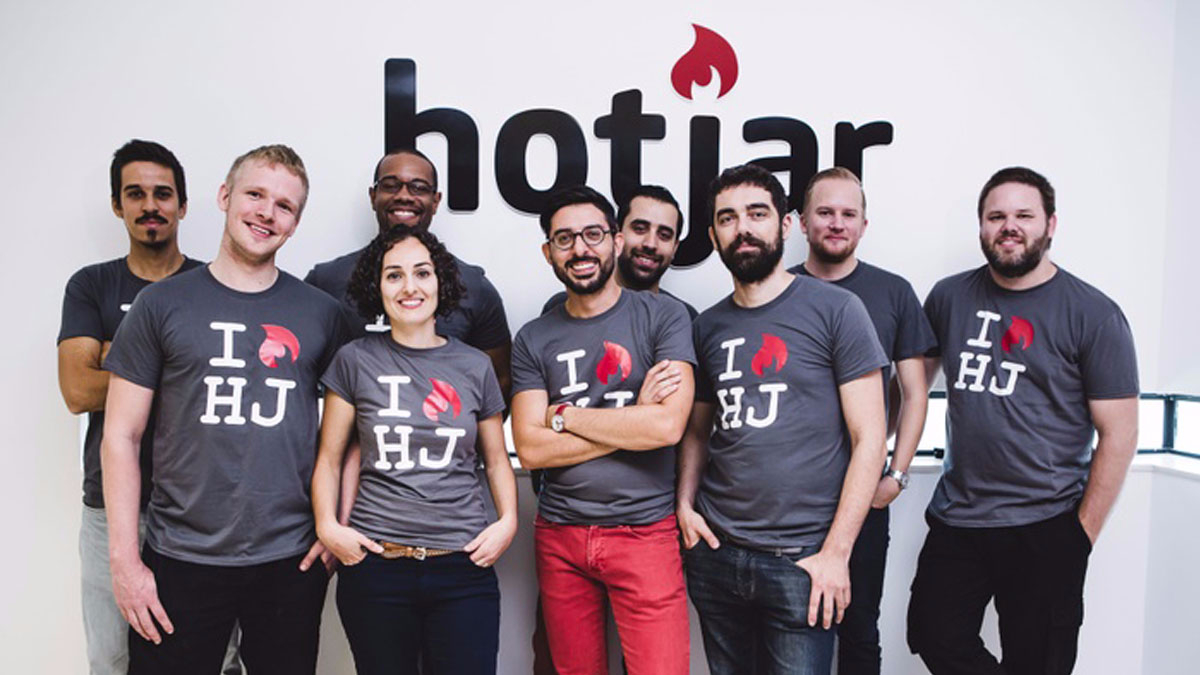User research and analytics startup Hotjar is doing something right.
In our last post, we talked about how just 3 years after launching, they’re already grossing $9.4 million per year and have 80,000 active users — without any venture capital or accruing any debt. Founder David Darmanin will tell you that one of the not-so-secret keys to Hotjar’s success is their global team. Hotjar is currently comprised of 42 individuals based out of 16 different countries.
But hiring globally comes with its own set of issues, such as how does one best promote a job opening across the world, and how do you attract top talent to a new company?
We spoke to Darmanin about Hotjar's exact hiring process, why he values potential over experience in new hires, and how he knows when someone is (or isn’t) a good fit.
Why Hire Remotely
Years before Darmanin founded Hotjar, he worked for a more traditional company that grew to 150 locally-based employees. "One of the things that frustrated me was that we couldn’t just go out and hire the people we wanted to hire, because we were limited by our geography," he said.
"If I’m building a global company, it feels like a mismatch to me that I’m hiring locally."
As a result, Hotjar has been all-remote from the start.
Note: Hotjar built their $9 million company with a fully remote team of developers. If you’re looking to do something similar, we’ve already vetted thousands of top remote developers worldwide. Click here to learn more and chat with us to find a good fit for your project and budget.
Hire for Potential, Not Experience
In their search for global candidates, Hotjar prioritizes potential over experience. Employees who are passionate about both the company and their role in it will accomplish more than someone with more experience but less drive. "You can have two interviews where one candidate can answer a question because they remember it, and the other one might say ‘I’ll figure it out.’ It’s hiring for that potential of someone who wants to seek and understand which usually is very powerful."
It’s powerful, he explained, because potential translates into hunger:
"Someone who has done it all, achieved everything — I don’t want to assume — but they’re probably going to be a little less hungry than someone who is still growing and coming up in their career."
For Darmanin, potential is composed of two things: passion and a growth mindset. "What I look for is passion in the area that they’re working on so you know the people are living and breathing this thing. They are going to acquire the skills, because if you have the right passion, that usually always happens."
To look for the desire to grow, he asks to see examples of their work over time. "When you get them to explain their career so far, and you can see what they’ve been doing, what they’ve learned and achieved, you typically see a pattern. It’s either someone may be doing the same thing over and over, and their passion lies elsewhere, so they are just working for the sake of working, compared to other people who are truly passionate about what they do and always learning and developing and becoming better. That is what we mean by potential."
Besides potential, the hiring team also looks for candidates who are predisposed for working remotely. "You don’t want to hire young people who have a track record of enjoying the office space and going out with everyone." The best hires Hotjar has found are typically “either young people who love to travel or someone who is more mature and is valuing time spent at home,” Darmanin said.
One of the questions Hotjar even asks on its survey is whether someone prefers working from home or in the office. “Guess what thirty percent of candidates replied? In the office."
The Hotjar team debating the future of Hotjar at one of their annual meetups
Hotjar’s Perfomance-Based Hiring Process
Much of the hiring process used by Hotjar falls under the concept of "performance recruitment" which Darmanin acquired through the book Personal MBA by Josh Kaufman. Applicants fill out a paper survey, then complete a video survey, and then a Skype interview.
But the final step is the most important:
Applicants that make it through this process are brought on for three days of paid work coordinating with the Hotjar team. The task is based off a prototype that Hotjar is developing. "That really allows us to see, after we’ve filtered this much, in the end, is there truly a culture fit in the way we communicate and work together?"
At the end of the three days, the hiring team and hiring manager decide if they want to make an offer. Darmanin only steps in if he feels the person will not be a good fit for the company. From the hiring process to managing the budget, Darmanin attempts to be as hands-off as possible. He trusts his team to make good choices, which fits into his philosophy of leading rather than managing his team.
For a different approach to remote hiring, see how Alertboot manages contractors and freelance developers to make encrption software.
Pursue people you believe will be a good fit
In the beginning, Hotjar’s approach was to cast a wide net through ads and posts on discussion forums. When hiring for specific positions, Darmanin and his hiring team relied on niche sites that appealed to a global audience. They also worked with agencies in countries where they’d already found talent, specifically the U.K., Portugal, and Malta.
While Darmanin said they found some great people this way, the downside of the wide net approach was that they were forced to field and reject a large number of applicants. Now they are beginning to change their strategy. Instead of attracting people to Hotjar through existing job openings, they are proactively seeking out individuals who seem like a good fit for the company.
"It’s this concept of how do we nurture and create relationships with people we think have the potential... so it’s not like running out to just hire someone, but building more of a roadmap of how do we bring the right people on board?"
To find and build these relationships, they start by using the expanding networks of their existing employees. Darmanin also makes a point of reaching out to individuals he admires.
One such person was a podcaster who interviewed Darmanin about Hotjar and is now the company’s content strategist. "He was extremely well prepared for the podcast … and his philosophy and his thinking around the questions was very similar to mine and our cultural values, so that was the first impact." When Darmanin did some background research, he found out that the podcaster had even spoken at events about how Hotjar could be improved.
"I noticed from his career, he had started working in-house and then left, tried to build something on his own, maybe failed, but then pivoted. So it was clear that this person had the right ideas and they were on a particular path … To me, at that point, it felt like [he] was either going to create a really successful business or go and work somewhere and be successful. It felt like it was going to be the next step in his journey. So he should come and join us. Especially since he was passionate about Hotjar, it felt like it would be a really good fit."
Darmanin also scooped up two early users of Hotjar who, as he explained it, were focused on building their own product, but weren’t gaining traction. Initially, he mentored the two entrepreneurs and got to know them well.
"What I went after was their ability to build things really quickly, which was quite impressive, and I think I was spot on with that, because when they joined that’s exactly what they brought on board." They became co-founders of the company, and two of the main engineers of the product.
Note: Darmanin talks about his struggles to find top talent. If you're looking to hire top freelance developers, we’ve already vetted thousands of the top developers worldwide. Click here to learn more and chat with us to find a good fit for your project and budget.
The Hotjar team at one of their annual meetups
How to Stay Competitive
Darmanin believes that one reason Hotjar stays competitive is because they are building a product that people are passionate about. "Our vision is to change the way people build and improve the web, changing the mindset from being based on a hunch or best practices to doing user research."
The right employees for Hotjar are people who want to see this vision realized.
"We look for people who believe in what we’re doing, so typically it’s not much about the money," Darmanin explained, “but we’re lucky enough that we are extremely competitive when it comes to salary.” Hotjar compares the average salary of bigger cities across the world and sets a salary range for each position that allows them to adapt the salary for where the candidate is from.
"We never allow ourselves to go under a range just because someone is let’s say from a rural area in Portugal. They would have the same minimum as someone working out of London."
The range is set by the salaries of existing team members and a candidate’s experience. While Hotjar does not seek out candidates with more experience, they understand that it is fair for more experienced employees to earn more.
When it Doesn’t Work Out
"Typically it’s down to one of the cultural values or more. For example it’s someone who doesn’t have a work ethic: they say they’re going to do something and then don’t do it. It’s never a case of someone not doing something to the level we wanted them to do. That’s something you give feedback, you learn, you reiterate, you improve it. It’s when you’re not seeing them driven, and they’re not being accountable for what they said they would do — that’s typically what sets off the alarm bells."
Usually this happens within the first few months of employment, but it’s usually not as clear cut. "It takes time to discover it, understand, and see it happening." Darmanin explains that what is most important to him is that the team is transparent with the individual about the issues that they are seeing and are continued to be treated with respect. “Just because it didn’t work out with us, these people might be better suited for other cultures or companies. The mindset we have is that no one should be surprised if it’s not going to work out.”
Hire People You Like
From day one, Darmanin has prioritized finding the right hires. Because Hotjar was bootstrapped, as soon as the company made revenue, they invested in new talent.
"We are trying to do something we truly believe in, and it’s giving us a lifestyle that we love, so we know that the only way to make that happen is not to think too short-term by putting money in our pockets, but more than anything, building something that can truly last."
While Darmanin is the face of Hotjar in many ways, when he talks of his company, the "we" is extremely important. Darmanin is grateful that he’s found people he enjoys working with. Employing an all-remote team fulfills his vision of looking for global talent, but it also allows him to work with individuals who share his love of the remote lifestyle.
For Darmanin and his team, a remote lifestyle includes more than just the ability to work from home and to travel — although both are important. Being remote means giving employees the freedom and flexibility they need to balance their personal lives with a commitment to the job and the company.
"Life is short – time is limited. It makes much more sense to decide how you want to live and then find amazing people who want to work with you while you live that way."
Note: Finding the right hires for his company is how Darmanin grew Hotjar from 0 to 80,000 active users in just 3 years. If you're looking for a qualified developer to join your team, we’ll match you with one of our pre-vetted candidates that meet your exact requirements. Click here to learn more about how CodementorX can help.





